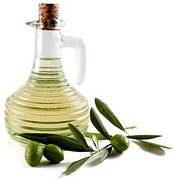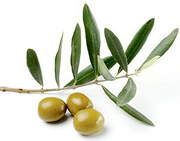Olive Oil Joins the Fight
By Dr. David Holland
Olives have been part of the Mediterranean diet for years. They are concentrated in monounsaturated fats, are a good source of vitamin E and contain many phytonutrient compounds including polyphenols and flavonoids, which have beneficial anti-inflammatory properties. In addition to the well-established benefits of olives, olive oils and olive products, recent studies indicate that olives may be the future in protecting against superbugs. The spread of two major offenders, MRSA (methicillin-resistant Staphylococcus aureus) and the HIV virus, can be slowed by a compound from olive oil and its leaves. What once were rare germs dealt with only by specialists are now invading the clinics and shopping malls in our communities. The HIV virus has gained a comfort zone with most practitioners. "Oh, you have HIV. Keep seeing your infectious- disease specialist," is what we say without a raised eyebrow. In contrast, MRSA knows no such boundaries. It will visit you whether you like it or not, and it is not satisfied with merely staying in the realm of the infectious-disease specialist. Luckily, we have within our reach the naturally occurring antimicrobial properties of the olive and its constituent plant parts, which may help draw some boundaries for these germs.
 MRSA - the "resistant Staph" bacteria - has taken on two forms: a hospital-acquired form and a community-acquired form (known as CA-MRSA). Each carries unique antibiotic-resistance properties but is resistant to the common, beta-lactam antibiotics that have historically been used for treating skin infections. Risk factors for the hospital-acquired form of MRSA include a history in the past year of hospitalization, diabetes, renal failure, surgery, admission to a nursing facility or previous MRSA infection, among others, while CA-MRSA may have no typical, antecedent risk factors. People and pets may be carriers for either type of MRSA. The germ is passed by the touch of a hand, so extra care should be taken to recognize what the infection looks like and prevent the spread of such infection to other family members, clients and co-workers. The most common appearance of a CA-MRSA infection is a lesion that is often mistaken for a "spider bite," a pustule or pimple, or ulcerated lesion that was once a pustule, with surrounding red, warm, painful and swollen tissue. If an abscess is present, the patient should proceed to a doctor to have it surgically drained, and the fluid should be cultured. At that point, antibiotics such as Bactrim or doxycycline are initiated. There is some debate about what to do with other household contacts once this person goes home - should everyone take antibiotics? Is hand washing good enough?
MRSA - the "resistant Staph" bacteria - has taken on two forms: a hospital-acquired form and a community-acquired form (known as CA-MRSA). Each carries unique antibiotic-resistance properties but is resistant to the common, beta-lactam antibiotics that have historically been used for treating skin infections. Risk factors for the hospital-acquired form of MRSA include a history in the past year of hospitalization, diabetes, renal failure, surgery, admission to a nursing facility or previous MRSA infection, among others, while CA-MRSA may have no typical, antecedent risk factors. People and pets may be carriers for either type of MRSA. The germ is passed by the touch of a hand, so extra care should be taken to recognize what the infection looks like and prevent the spread of such infection to other family members, clients and co-workers. The most common appearance of a CA-MRSA infection is a lesion that is often mistaken for a "spider bite," a pustule or pimple, or ulcerated lesion that was once a pustule, with surrounding red, warm, painful and swollen tissue. If an abscess is present, the patient should proceed to a doctor to have it surgically drained, and the fluid should be cultured. At that point, antibiotics such as Bactrim or doxycycline are initiated. There is some debate about what to do with other household contacts once this person goes home - should everyone take antibiotics? Is hand washing good enough? The fact is many people are carriers for such bacteria and they may exhibit no symptoms at all; hence the fact that hand washing remains the single most important means of preventing the spread of contagious or infectious germs. CA-MRSA typically causes skin infections (though some infections may be systemic). With harmful germs, stopping the spread is obviously the key. Bacteria multiply and spread. HIV viruses multiply and spread. What are some ways, beyond hand washing, that we can help prevent the spread? The cherished olive, Olea europaea, whose oil, fruit and leaves already infiltrate our medical literature with beneficial properties against cancer and heart disease, can be our friend in this fight against infectious diseases as well. Olive leaves are particularly beneficial because they contain a broad range of antimicrobial substances. At least seven compounds, all of which possess "unusual" combined antibacterial and antifungal properties when tested in a lab against several common human pathogens, have been found in olive leaves. One of these compounds is called "oleuropein," which is found in concentrated form in many over-the-counter olive-leaf products. However, these products deny the other six compounds (caffeic acid, verbascoside, luteolin 7-O-glucoside, rutin, apigenin 7-O-glucoside and luteolin 4'-O-glucoside) an equal opportunity to do their job. A whole olive-leaf product would be superior to a customized, concentrated form that emphasizes or touts a particular, standardized concentration of the one single agent. The broad-spectrum antimicrobial nature of olive leaf is particularly appealing in the face of the one-sided onslaught of antibiotics that many patients endure via conventional medical practices. The thought of supplying an antifungal or high-quality probiotic to counter the negative effects of a prescribed antibiotic never crosses the minds of most health care providers. That's why it's so refreshing to see the broad antibiotic and antifungal activity that's already built in to such natural antimicrobials as olive leaf. For the person who has come in contact with a CA-MRSA-infected person or carrier, it may be the perfect antimicrobial prophylaxis. In addition, olive-leaf extract in a nasal-spray form, may benefit the colonized MRSA carrier. Historically, the antibiotic ointment mupirocin (Bactroban) has been used for eradicating Staph bacteria from the nose. However, only a few studies can actually equate this practice to reducing Staph infections, and some studies show that re-colonization of the nasal cavity occurs with time, so this practice is not supported by current evidence. Nevertheless, the practice is not condemned and is often still recommended. Recent independent laboratory testing with an intranasal form of olive-leaf extract (OLE) showed an impressive and rapid annihilation of MRSA bacteria within 15 seconds of exposure to the OLE.
 The nose is a perfect, moist carrier site for bacteria. Think of how often you see people touching, wiping, scratching and rubbing their noses (perhaps before they shook your hand). It only makes sense that contact with someone with MRSA or someone with recurring MRSA skin infections (a likely nasal carrier for MRSA) would use such a treatment as a nasal OLE preparation, along with an oral, whole olive-leaf extract. There are no barriers for who can acquire MRSA - babies and elderly, male and female - and once again, stopping the spread is the key.
The nose is a perfect, moist carrier site for bacteria. Think of how often you see people touching, wiping, scratching and rubbing their noses (perhaps before they shook your hand). It only makes sense that contact with someone with MRSA or someone with recurring MRSA skin infections (a likely nasal carrier for MRSA) would use such a treatment as a nasal OLE preparation, along with an oral, whole olive-leaf extract. There are no barriers for who can acquire MRSA - babies and elderly, male and female - and once again, stopping the spread is the key. In regard to HIV, olive-leaf extract may introduce a whole new facet of post-exposure prophylaxis (what to take after you've been stuck by a needle or potentially exposed to the HIV virus). OLE, without toxicity to healthy, uninfected cells, not only inhibits acute infection with the virus but also prevents cell-to-cell transmission of the HIV virus (preventing the spread of the virus to uninfected cells), as well as HIV replication within the cell. Researchers at the University of Granada isolated maslinic acid from the dry olive-pomace oil. Maslinic acid is specifically found in the wax of the olive skin. Olive-pomace oil is considered an inferior-grade oil that is made by combining virgin olive oil with the pomace, or the ground flesh and pits that remain from previous olive pressings that were used in making olive oil. Maslinic acid inhibits serine-protease, much like some of the pharmaceutical anti-HIV drugs on the market now. With the use of olive-pomace oil, a monumental 80 percent reduction in HIV spreading in the body was obtained. Maslinic acid also is very effective against some of the parasitic infections seen in patients with advanced HIV infections or AIDS. Therefore, it may serve a dual, antiviral and anti-parasitic role in such patients. I see a pharmaceutical drug on the horizon, unfortunately. "Maz-low." Remember, Pharma: Whole olive leaf has many other, active compounds that still need to do their job. The goal is to alleviate the fear that there is nowhere to turn but to drugs when dealing with such bad bugs as MRSA and HIV. Obviously, these germs still kill people - lots of them, unfortunately. Yet many of these deaths are in spite of drug therapy. Perhaps a more balanced approach with broad-spectrum antimicrobials, when used early or in less severe cases, will lead to fewer rampant infections and less spread of the germ to other contacts. Consider turning to olive-leaf extract as a natural alternative. Talk to your doctor for more information.
David Holland, MD, practices in El Paso, Texas and specializes in family practice, nutritional consultation and occupational medicine.
Page printed from:
http://www.toyourhealth.com/mpacms/tyh/article.php?id=1005&no_paginate=true&no_b=true
|

